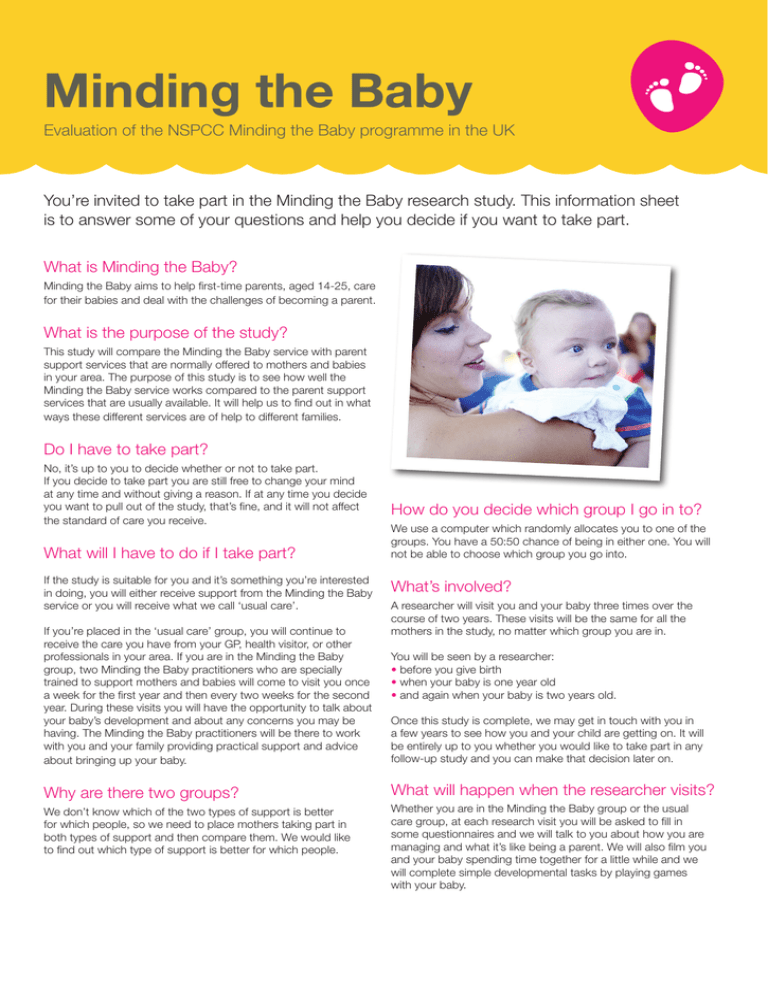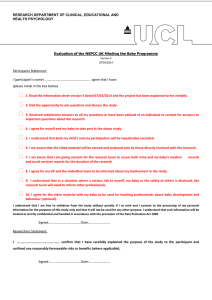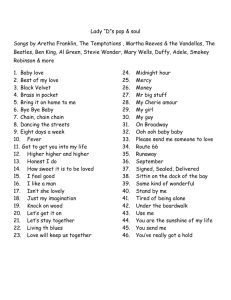
Minding the Baby
Evaluation of the NSPCC Minding the Baby programme in the UK
You’re invited to take part in the Minding the Baby research study. This information sheet
is to answer some of your questions and help you decide if you want to take part.
What is Minding the Baby?
Minding the Baby aims to help first-time parents, aged 14-25, care
for their babies and deal with the challenges of becoming a parent.
What is the purpose of the study?
This study will compare the Minding the Baby service with parent
support services that are normally offered to mothers and babies
in your area. The purpose of this study is to see how well the
Minding the Baby service works compared to the parent support
services that are usually available. It will help us to find out in what
ways these different services are of help to different families.
Do I have to take part?
No, it’s up to you to decide whether or not to take part.
If you decide to take part you are still free to change your mind
at any time and without giving a reason. If at any time you decide
you want to pull out of the study, that’s fine, and it will not affect
the standard of care you receive.
What will I have to do if I take part?
If the study is suitable for you and it’s something you’re interested
in doing, you will either receive support from the Minding the Baby
service or you will receive what we call ‘usual care’.
If you’re placed in the ‘usual care’ group, you will continue to
receive the care you have from your GP, health visitor, or other
professionals in your area. If you are in the Minding the Baby
group, two Minding the Baby practitioners who are specially
trained to support mothers and babies will come to visit you once
a week for the first year and then every two weeks for the second
year. During these visits you will have the opportunity to talk about
your baby’s development and about any concerns you may be
having. The Minding the Baby practitioners will be there to work
with you and your family providing practical support and advice
about bringing up your baby.
How do you decide which group I go in to?
We use a computer which randomly allocates you to one of the
groups. You have a 50:50 chance of being in either one. You will
not be able to choose which group you go into.
What’s involved?
A researcher will visit you and your baby three times over the
course of two years. These visits will be the same for all the
mothers in the study, no matter which group you are in.
You will be seen by a researcher:
• before you give birth
• when your baby is one year old
• and again when your baby is two years old.
Once this study is complete, we may get in touch with you in
a few years to see how you and your child are getting on. It will
be entirely up to you whether you would like to take part in any
follow-up study and you can make that decision later on.
Why are there two groups?
What will happen when the researcher visits?
We don’t know which of the two types of support is better
for which people, so we need to place mothers taking part in
both types of support and then compare them. We would like
to find out which type of support is better for which people.
Whether you are in the Minding the Baby group or the usual
care group, at each research visit you will be asked to fill in
some questionnaires and we will talk to you about how you are
managing and what it’s like being a parent. We will also film you
and your baby spending time together for a little while and we
will complete simple developmental tasks by playing games
with your baby.
Unfortunately, we are not able to include all parents in this
research, and so we are focusing on mothers who are younger
and having their first child, as well as mothers who do not have
major health difficulties. Before you sign up we need to check
these things and ask you a few background questions.
Will it be difficult to do?
Parents usually find the questionnaires quite interesting, and
talking about their relationship with their baby is often enjoyable
or helpful. The babies seem to enjoy the simple tests and the
parents often enjoy seeing what their baby can do.
What are the possible disadvantages
and risks of taking part?
Sometimes the questionnaires and interviews used in this study
can be a bit upsetting because they include some questions
asking about any problems you might be experiencing. During
all the assessments you are free to stop at any time and you
don’t have to talk about anything that you don’t want to. The
assessments do take some time (about two hours), and that
might be difficult if you’re very busy. The researchers would
always do their best to fit in around your life and visit you at
a convenient time.
What are the possible benefits of taking part?
Both the Minding the Baby service and the usual care that is
normally offered have been very helpful for many parents and
children. Also, the information we get from this study will help us
provide the best services to other families with young children in
the future. So if you take part you will know that you are making
a difference for others like you. For each of the research visits you
will also be given a shopping voucher worth £20 to thank you for
your time and a cuddly toy for your baby.
What if something goes wrong?
We hope you find your involvement in the study helpful. We want
to make sure you are happy with the time you spend with us.
However, if you are not happy with anything about the research
or service you receive please don’t hesitate to contact us using
the details at the end of this information sheet.
Who is organising the research?
University College London (UCL) and the NSPCC are working in
partnership. UCL will be responsible for all parts of the research,
no matter which group you are placed in. In addition, the NSPCC
will be providing the Minding the baby service.
Will my taking part in this study
be kept confidential?
All the information we collect will be stored in line with the Data
Protection Act 1998. This means:
• the information you give will be kept strictly confidential
• all information gathered will be filed away in a locked cabinet
at our research site
• only the research staff will be able to look at the information you
give us. Your name or any other personal details will not appear
on any of your data
• all personal information you give us will remain locked away
separately from your data and then destroyed after five years.
If you are placed in the Minding the Baby group, the Minding the
Baby practitioners will contact you directly to make appointments.
When you’re involved in the study, the things you talk about won’t
be shared with anyone else unless you say it’s OK. But if you tell
us something that makes us think there is a serious risk to you,
your baby or the safety of others, then we are legally obliged, like
all organisations, to notify other professionals so that you and
your baby can be kept safe. This would include involving child
protection services if it concerns your baby, another child, or you,
if you are under 16.
With your permission, we will write to your GP and your midwife
after you have been allocated to a group and inform them of your
involvement in the study.
When we report the results of the study, we will not include any
personal details about any of the families that took part so that
they can’t be recognised. When the research is complete we
will send out a report to all families who took part to inform them
about the results of the study. The information that we will provide
in this report will be completely anonymous and individual families
will not be mentioned.
Contact for further information
If you would like further information about the study, please
contact your research midwife [name] on [number]. You may
also contact the research team directly on [number]. If you would
like general advice on taking part in research studies you can
talk to your local NHS Patient Advice and Liaison Services
(PALS) on [number].
Complaints
We hope that you are happy with the study and find it helpful.
However, if you are unhappy with any part of the study, and you
would like to make a complaint, you can contact Pasco Fearon on
0207 679 1244. Or, you can pass on a complaint to any NSPCC
member of staff, volunteer, or local office. You can also email
comments@nspcc.org.uk or call 020 7825 2775 and quote the
name of the project, ‘Minding the Baby’.
r time
u
Thank you for yo
Parent Information Sheet | Version 3 | 07/03/2014
This study has been approved by the NHS research
ethics committee (NRES committee – Dulwich).
© 2013 NSPCC - all rights reserved. J20131014. Photography by Jon Challicom. Registered charity numbers 216401 and SC037717.
Can anyone take part in the research?






